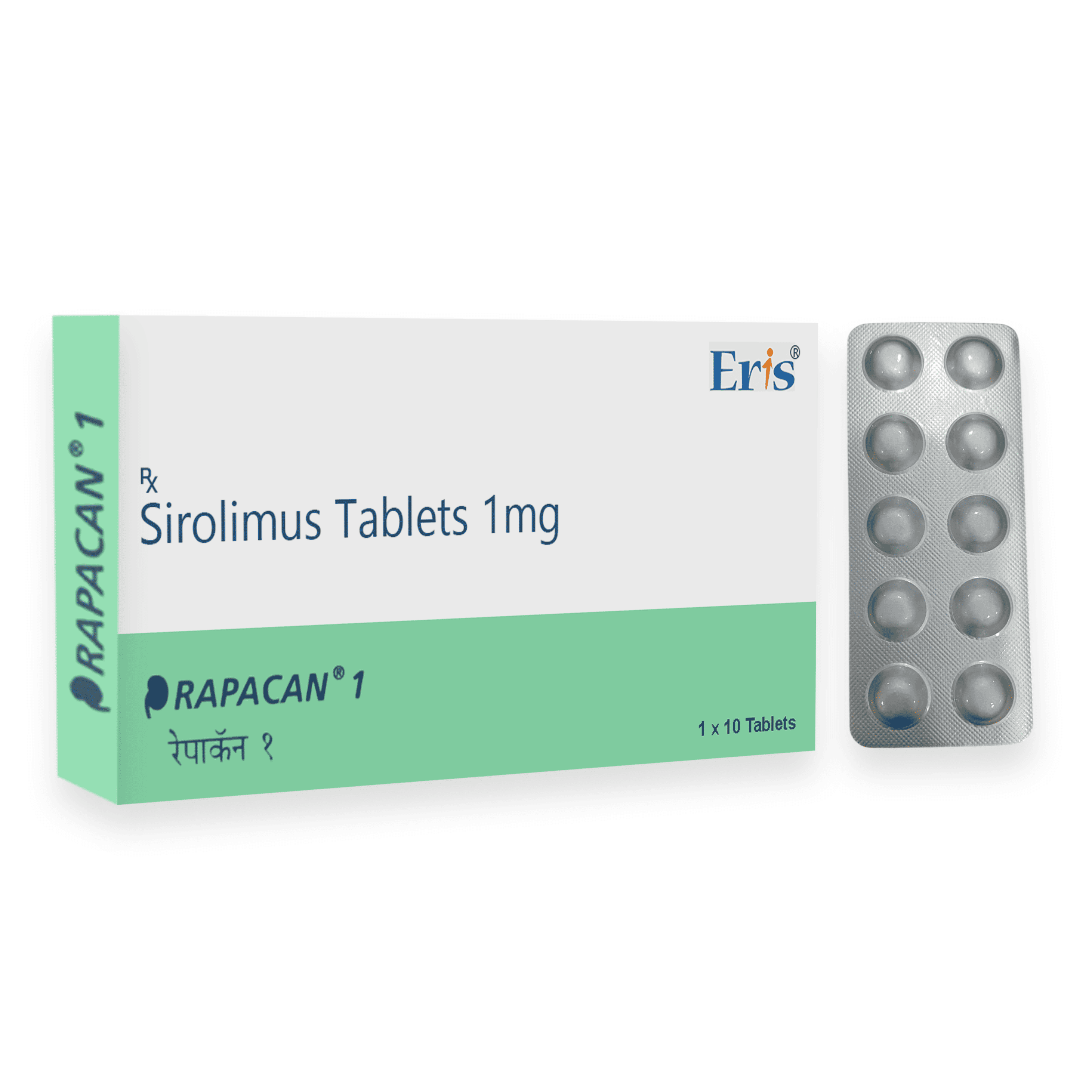RAPACAN 1 MG
Price range: $60.00 through $170.00
| Mg | No-of-tablets | Price | Quantity | |
|---|---|---|---|---|
| 1 MG | 50 PILLS | Original price was: $90.00.$60.00Current price is: $60.00. | ||
| 1 MG | 100 PILLS | Original price was: $145.00.$120.00Current price is: $120.00. | ||
| 1 MG | 120 PILLS | Original price was: $190.00.$142.00Current price is: $142.00. | ||
| 1 MG | 150 PILLS | Original price was: $225.00.$170.00Current price is: $170.00. |
What is Rapacan 1 Mg?
Rapacan 1 Mg is a prescription-only immunosuppressant medicine that contains Sirolimus as its active ingredient. It belongs to the class of mTOR inhibitors (mammalian target of rapamycin inhibitors) and is primarily used in kidney transplant patients to prevent the body’s immune system from rejecting the new organ.
Rapacan 1mg (Sirolimus) plays a life-saving role in preventing organ rejection for kidney transplant patients. While highly effective, it requires careful monitoring, medical supervision, and lifestyle adjustments to ensure safety.
Sirolimus helps reduce the activity of immune cells responsible for attacking transplanted organs, ensuring long-term survival and functionality.
When it comes to advanced treatment options for organ transplant patients, Rapacan 1 mg has become an essential prescription medicine. Known for its effectiveness in preventing organ rejection and improving survival rates, this drug plays a vital role in immunosuppressive therapy. If you’ve been searching for detailed insights on this medication, you’re in the right place.
If you’ve been prescribed Rapacan 1mg or are considering options for transplant care, always consult your doctor before starting or adjusting any medication.
- Generic Name: Sirolimus
- Brand Name: Rapacan
- Strength: 1 Mg tablet
- Therapeutic Class: Immunosuppressants (mTOR inhibitor)
- Primary Use: Prevention of organ rejection (especially kidney transplant)
- Prescription Required: Yes
How Rapacan 1mg Works?
This tablet works by inhibiting T-lymphocyte activation and proliferation, which are the immune system cells responsible for organ rejection. By suppressing these immune responses, Rapacan helps ensure that the transplanted kidney is accepted by the body.
This mechanism differs from that of other immunosuppressants, such as calcineurin inhibitors (e.g., tacrolimus or cyclosporine). Many doctors prescribe this medicine as part of a combination therapy to achieve better immunosuppression while minimizing side effects.
Uses of Rapacan 1mg
1. Kidney Transplantation
The most common use of Rapacan 1 Mg is in renal transplant patients. It helps in preventing acute rejection episodes and supports long-term graft survival.
2. Liver and Lung Transplants (Off-label)
Although not the first-line choice, in certain cases, this tablet is used off-label for other organ transplants under strict medical supervision.
3. Treatment of Certain Cancers
Rapacan (Sirolimus) is also being studied for its anti-tumor activity, particularly in cases of lymphangioleiomyomatosis (LAM) and certain rare cancers, as reported by the National Cancer Institute (NCI).
Dosage
- Typically, patients begin with a loading dose, followed by a maintenance dose tailored to their weight and response.
- Blood levels of Sirolimus must be monitored regularly to avoid toxicity.
- This medicine should be taken orally, once daily, at the same time each day, either with food or consistently without food to maintain stable absorption.
Important: Dosage must be individualized. Make sure you consult your doctor before self-medicating or adjusting your dose without a prescription.
Side Effects
Like any prescription medicine, Rapacan 1 Mg may cause side effects. According to the WHO and Healthline, some of the most common ones include:
- Mouth ulcers
- Diarrhea or constipation
- High cholesterol and triglycerides
- Swelling in ankles or hands (edema)
- Joint pain
- Increased risk of infections (due to immunosuppression)
- Severe allergic reaction
- Liver dysfunction
- Breathing difficulties or lung toxicity
- Delayed wound healing
Drug Interactions
Rapacan can interact with several drugs, which may alter its effectiveness or increase side effects.
Common interacting drugs include:
- Antifungal medicines (ketoconazole, itraconazole)
- Antibiotics (clarithromycin, erythromycin)
- Anticonvulsants (carbamazepine, phenytoin)
- Other immunosuppressants (cyclosporine, tacrolimus)
- Blood thinners like Xaretlo 20 mg (Rivaroxaban) – caution required as both may increase the risk of bleeding or other complications
Rapacan 1 Mg vs Xaretlo 20 Mg
- While Rapacan 1 Mg is primarily used for transplant patients, Xaretlo 20mg (Rivaroxaban) is a blood thinner prescribed to prevent blood clots, deep vein thrombosis (DVT), pulmonary embolism (PE), and stroke in atrial fibrillation patients.
- Both are prescription medicines, but serve different therapeutic purposes. It’s important not to confuse the two, although they may sometimes be prescribed together in high-risk transplant patients who also require anticoagulation.
Precautions
- Inform your doctor if you have liver disease, high cholesterol, or any other underlying medical conditions.
- Avoid live vaccines while on Rapacan.
- Pregnant or breastfeeding women should not take Rapacan unless prescribed.
- Regular blood tests are mandatory to check drug levels and organ function.
Storage
- Store Rapacan 1 Mg tablets at room temperature (15–30°C).
- Keep away from moisture, direct sunlight, and children’s reach.
FAQs
1. What is Rapacan 1 Mg used for?
Rapacan 1 Mg is mainly used to prevent organ rejection in kidney transplant patients.
2. How long should I take Rapacan 1 Mg?
Most transplant patients require lifelong immunosuppressive therapy, but the dosage and duration vary from patient to patient.
3. Can Rapacan 1 Mg be taken with Xaretlo 20 mg?
Both drugs may be prescribed together in certain conditions, but only under strict medical supervision due to potential drug interactions.
4. Does Rapacan 1 Mg increase infection risk?
Yes, since it suppresses the immune system, patients are at higher risk of infections and should take extra precautions.
5. What foods should I avoid while taking Rapacan 1 Mg?
Avoid grapefruit and grapefruit juice as they can interfere with Sirolimus metabolism.
6. Can pregnant women take Rapacan 1 Mg?
It is generally not recommended in pregnancy unless the doctor decides benefits outweigh the risks.
7. Is Rapacan 1 Mg the same as Rapamune?
Yes, Rapamune is another brand name for Sirolimus, similar to Rapacan 1 Mg.
| Generic-name | Sirolimus |
|---|---|
| Manufacturer | BIOCON |
| Packaging | 10 Tablets In 1 Strip |
| Strength | 1 MG |
| Time-delivery | 8 – 15 DAYS |




Charles walker –
I’ve been using this tablet as prescribed, and it’s working well with minimal side effects. Easy to take and effective.
Liam Thompson –
After my kidney transplant, these pills were prescribed as part of my immunosuppressive therapy. I ordered it through LoveMyMed, and the experience was smooth. The medicine is authentic, and I received it in perfect condition. Overall, the quality of the medication and reliability of delivery were excellent.